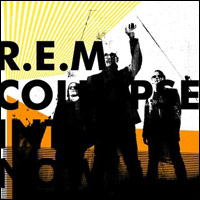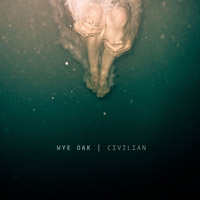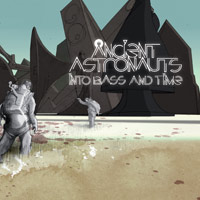
Collapse Into Now
Warner Bros.
Having grown up with REM as a lynchpin of my formative music discoveries, I get an instinctual surge of excitement at each prospect of a new album from the one-time kings of the underground. Call me Pavlov’s proverbial dog, because I don’t even know why anymore. While REM once created nuanced hybrids of paisley jangle, post-punk electricity and Southern sensibility, they long ago gave up the ghost and have failed to create anything truly memorable in almost two decades. (And Monster is only remarkable for its pervasiveness in the cut-out bin.) I challenge anyone to name a song off the top of his head from Reveal, Around the Sun or Accelerate (the band’s last three albums). Unless you’re Michael Stipe, it’s not happening.
So why should I think anything would be different with Collapse Into Now, the band’s 15th album? Few artists make it as far as 15 records, but all the more reason for great expectations. (To give this some perspective, the Stones’ 15th album was Emotional Rescue, Blood on the Tracks was Dylan’s 15th record, and Let’s Dance was number 15 for Bowie.) But Stipe and company have contented themselves with simply adding another notch in their collective belt, as Collapse is filled with motifs common to the REM songbook. Leadoff track “Discoverer” is a big stadium rock song in the vein of “Turn You Inside Out,” while the antithetical “Überlin,” with its acoustic guitars and phonetic wordplay, will be familiar to even the band’s most casual fans.
But while familiarity is not always an inherent fault, REM’s not even capable of doing REM well these days. (The Decemberists probably do REM better on their latest.) “Oh My Heart” shows the widening cracks in Stipe’s voice, as does “It Happened Today,” which could have benefitted from putting the stronger vocals of Eddie Vedder and Joel Gibb (Hidden Cameras) to better use. Even Patti Smith’s distinctive caterwaul can’t save “Blue” from sounding hokey, though she comes close, and “Mine Smell Like Honey” may just be the worse thing the band has written since “Shiny Happy People.” But all this doesn’t matter. The truth is, just as with the ones before it, we will have forgotten this REM album by the time the next one comes down the pike.
Stephen Slaybaugh

Smoke Ring for My Halo
Matador
Up to this point, it’s been hard to gauge what kind of artist Kurt Vile wants us to see. On one hand, he’s a bedroom psych revivalist with a wide range of lo-fi tempered recordings, sometimes solid and sometimes youthfully ambling. On the other, he’s become a de facto rock god, fronting the mammoth Violators as if he’s survived years on the hardscrabble tour circuit, living out the blues he’s jammed into every groove bearing the band’s name. Smoke Ring for My Halo is a risky move for Vile. Sans the Violators, we have to accept him as a refined songwriter. Sans the tape hiss and awkward indulgence of his early work, we are able to see if those attributes were disguises to mask a lack of flesh and color in his arrangements. Somewhere in the middle is where this record decides to rest, as it is labored in its portrayal of Vile as the road-weary everyman, but shines as a display of Vile’s ability to craft his songs with a skillful, imaginative hand.
“My life’s been one long-running gag,” he sings on “Society Is My Friend,” and throughout the album,Vile repeatedly refers to himself as a ghost, a puppet to the man, and a train-hopping boho drifting through the ills of the world around him. Though it’s hard to truly believe the guy has suffered through this life of misery, like his heroes, which range from Neil Young to the originators of outlaw country, there’s always a line between the fact and fiction in our narrator’s woes. There are vitamins versus dope haze, self-imposed melancholia versus circumstantial late night revelry, and clear thoughts and finger-picking versus musky jam and exotic atmospheres. That doubling is what makes the album intriguing beyond the standard singer-songwriter commentary. Fortunately, the sheer labyrinthine nature of Vile’s guitar playing is what eventually cancels out the hokum of his voluble lonely guy laments. The frequent Dylan-esque rambling, the mutterings about youth and hard times, and the stream-of-consciousness ranting go unnoticed once the luxurious sonics with which Vile surrounds them start to take hold. The big, bold psychedelic bloom of “Ghost Town” is as unwieldy and wooly as Vile’s work with the Violators behind him, thanks to the endless space in the room and the increased love for scruffy ’70s accents. The scattered harp plucks lend a dreamy quality throughout “On Tour,” as does the spectral ooze that dots the intricately woven “Baby’s Arms.”
It’s the glistening reflection of Vile’s “In My Time” which really stands out, though, countering and centering the grim beauty of the album that precedes it with a prettiness unheard from Vile thus far in his career. Were it not for the scorching bloozy soloing and the breathless, accentuated “lazy” in Vile’s voice, one could mistake “In My Time” as John Mayer-ish pop radio fluff. Crisp and clean cut, the song reveals a songwriter who could possibly soar in that crowd, mawkish and earnest all the same. It’s sincerity above all which makes Smoke Ring for My Halo a triumph among Vile’s increasingly potent catalog. Stripped completely bare and recorded in a spacious room with only Vile’s guitar, these tunes would be equally affecting, but Vile is equipped with a grander scope, fleshing out perfectly executed folk songs with layers of warm, glowing tones. Smoke Ring for My Halo is an enthralling statement for its artist and further proof of Vile’s oft-touted genius.
Kevin J. Elliott
MP3: “Jesus Fever”

Civilian
Merge
Wye Oak, comprised of native Marylanders Andy Stack and Jenn Wasner, is perhaps known to audiences mostly for the near-constant comparisons by the media to another male-female, dream-pop duo, Beach House. Perhaps such an assessment was indeed accurate concerning the duo’s superbly serene 2009 release, The Knot, but it doesn’t seem so apt anymore. The duo’s latest, Civilian, is a grandiose undertaking that finds them experimenting with a deeper and moodier sound than that on its predecessor.
With Civilian, the duo again shows a keen ear for songwriting and arranging, building dreamscapes only to be torn down by squealing guitars. From the very first track, the masterfully layered “Two Small Deaths,” to the lull of the rolling “Plains,” Wye Oak create an onslaught on the senses. Unlike The Knot, which maintained a steady, if somehwhat dull, pace throughout, Civilian ebbs and flows while weaving its own wonderfully cockeyed path. The title track begins unassuming enough, but unfolds into a frenetic boom of distorted guitars and affecting vocals. Wasner’s irresistibly sultry voice shines, along with her distinct, jutting guitar riffs, proving that she’s more than just a quirky girl in a band, but a true musician.
Though devoid of some of the lovably hazy wanderlust of Wye Oak’s youth, Civilian is a brilliant manifestation of the abilities that have grown with each successive album. Experimenting with bolder sounds has proven that Wye Oak should no longer merely be lumped in with other bands, as they are clearly leading the pack.
Jennifer Farmer
MP3: “Civilian”

Into Bass and Time
Friendly Fire
While Kabanjak and Dogu have manned the boards for like-minded artists like Ladybug Mecca (Digable Planets), Imani and Bootie Brown (The Pharcyde) and Kid Loco, they’ve taken their experiences as producers and cooked up a similarly collaborative experience with their second album as Ancient Astronauts, Into Bass and Time. It is a well thought out record, with a near-perfect balance between guest vocalists and the instrumental tracks. However, the best part about the record is how many bases they cover without being too showy about it. There’s hip-hop, dancehall, Latin grooves, some Middle Eastern flavoring, and bits and pieces of so many other things. But while others may be tempted to call attention to what they’re doing to show how clever they’re being, Ancient Astronauts have no time for that. When the opening track (“Bass and Time”) comes sliding out of the speakers, it’s amazing at how subtle it is.
Equally shocking is just how warm the album sounds. Too often the mid-range and treble are turned up within an inch of their life in the desire to make “bangers.” But here it sounds like the whole record was recorded in a honey-toned wood-lined room. Sonically, Into Bass and Time also has much in common with the unfortunately maligned trip-hop movement of the ’90s, but separates itself with content possessing a sense of humor. They titled one of the tracks “Anti Pop Song,” and on “Still a Soldier” a KRS-One sample proudly declares “Me never ever ever crossover! Me never ever ever go commercial!” But while some might declare the same thing with angry defiance and backpack straps pulled tight, the Ancient Astronauts give it a wink and shrug. They’ve crafted a fun, masterful record that never loses momentum.
Dorian S. Ham

The Electronic Anthology Project
self-released
With some music, if you listen to it enough and really enjoy it, it pops up in your head out of nowhere while, say, in the dentist chair trying to drown out the adult contemporary. Over time, even if you don’t actually listen to the songs, they become shadows of themselves, mere signifiers of the time you spent actually receiving aural stimulation from those songs. The rough edges get hewn off, and the nuances of the dynamics disappear. I thought this was something that only happens in my head, but then I heard Bret Nelson’s Electric Anthology Project.
Bret is a new wave nut, silly for all things synthesized. He also happens to play bass in a band that essentially defines guitar-driven indie rock—not quite the opposite of new wave, but at the core, certainly focused on very different sounds and rhythms. So, he took some particularly awesome songs from the healthy catalogue of that band, Built To Spill, and transformed them into synth pop.
At first, singer Doug Martsch had doubts about reprising his vocals for the project, but Nelson insisted the songs would sound incomplete. And they would. These songs, sans Martsch’s voice, would be akin to the Moog versions of Mozart from the ’70s. Doug’s voice is integral to the original music, especially on these particular songs. Besides, he reprised Treepeople lyrics with Built To Spill and is obviously a fan of appropriating other artists’ work (like the Velvet Underground and Smiths).
I wish Nelson would have skipped the synthesized guitar sounds (or whatever they are that sound kind of like guitar) and went straight for only weird Arp, Korg, and Moog tones. There are a few missed opportunities to really tweak some of the rhythms and melodies so that they fit the aesthetic Nelson was going for. Like on “A Gloss Siren,” (originally “Israel’s Song”), the guitar melody could have been pinched so that it was a little more herky-jerky, like the Human League or something. Nelson’s wife turned all the titles into anagrams of themselves, but the songs are immediately recognizable to any more-than-casual fan, and for the purist, are worth cranking as loud as possible. I’m glad I listened to the music first and figured out the songs that way, instead of finding out in a review (ahem).
The novelty of playing guitar-driven indie rock as new wave synth pop is cute, though it’s not that far of a stretch to imagine Built To Spill as a dreamy synth band. It happened to me for a while, when those old Built To Spill songs I memorized started to erode.
Michael P. O’Shaughnessy
ALBUM REVIEWS
Tim Cohen, Magic Trick and Bad Blood EP
Beady Eye, Different Gear, Still Speeding
Acrylics, Lives and Treasure
Cheveu, 1,000
Radiohead, The King of Limbs
Toro y Moi, Underneath the Pine
Yuck, Yuck
Beans, End It All
PJ Harvey, Let England Shake
Bright Eyes, The People's Key
DeVotchKa, 100 Lovers
Chain & the Gang, Music's Not for Everyone
Win Win, Win Win
East River Pipe, We Live in Rented Rooms
